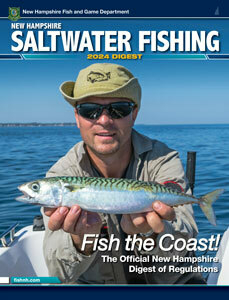Fish Consumption Guidelines
Is it Safe to Eat the Fish?
Some ocean fish and shellfish contain varying levels of pollutants like mercury, PCBs and dioxins. Because of this, the N.H. Department of Environmental Services recommends the following guidelines:
Best Choices:
Cod, flounder, haddock, herring, light tuna (canned), pollock, sole, salmon, tilapia, shellfish (oysters, shrimp, crab, clams, scallops, lobster)—Pregnant and nursing women, women who may become pregnant, and young children can safely eat TWO meals per week. For all others, no limit as part of a balanced diet.
Good Choices:
Halibut, red snapper, tuna steak, white tuna (canned)—Pregnant and nursing women, women who may become pregnant, and young children can safely eat ONE meal per week. For all others, no limit as part of a balanced diet.
Cautions:
Bluefish, Striped Bass
Pregnant and nursing women, women who may become pregnant, and young children should avoid consumption. For all others, eat no more than ONE meal per month.
King Mackerel, Swordfish, Shark, Tilefish
Pregnant and nursing women, women who may become pregnant, and young children should avoid consumption. For all others, limit to TWO meals per month.
Lobster Tomalley (green substance in lobster)
Everyone avoid consumption. All other parts of the lobster, no limits as part of a balanced diet.
Stick to the lowest weekly or monthly limits when combining freshwater fish, ocean fish and shellfish. Do not add limits. For more freshwater and saltwater guidelines, contact:
N.H. Department of Environmental
Services, Environmental Health Program
(603) 271-1370
www.des.nh.gov/home-and-recreation/boating-and-fishing/fish-consumption
Wildlife & Sport Fish Restoration: 80 Years of Restoring, Managing and Researching Fish and Wildlife
Our thanks to hunters, shooters, anglers, boaters and our industry partners! With the purchase of firearms and ammunition, archery equipment, fishing equipment, and motorboat fuels, hunters, anglers and manufacturers pay excise taxes that are distributed to state fish and wildlife agencies for approved projects.
The U.S. Fish and Wildlife Service joins state fish and wildlife agencies, private industry and the public in a partnership to conserve fish and wildlife resources.
With help from over $150 million in federal aid funding over nearly three quarters of a century, N.H. Fish and Game has been able to:
- Gain knowledge through research
- Manage fish and wildlife populations
- Acquire Wildlife Management Areas
- Improve and protect aquatic habitat
- Restore fish and wildlife populations
- Conduct Hunter and Aquatic Education programs
- Construct, upgrade and maintain more than 140 public access sites for boating and fishing.
Your purchase of hunting and fishing equipment and motorboat fuels supports wildlife and sport fish restoration and boating access facilities.


